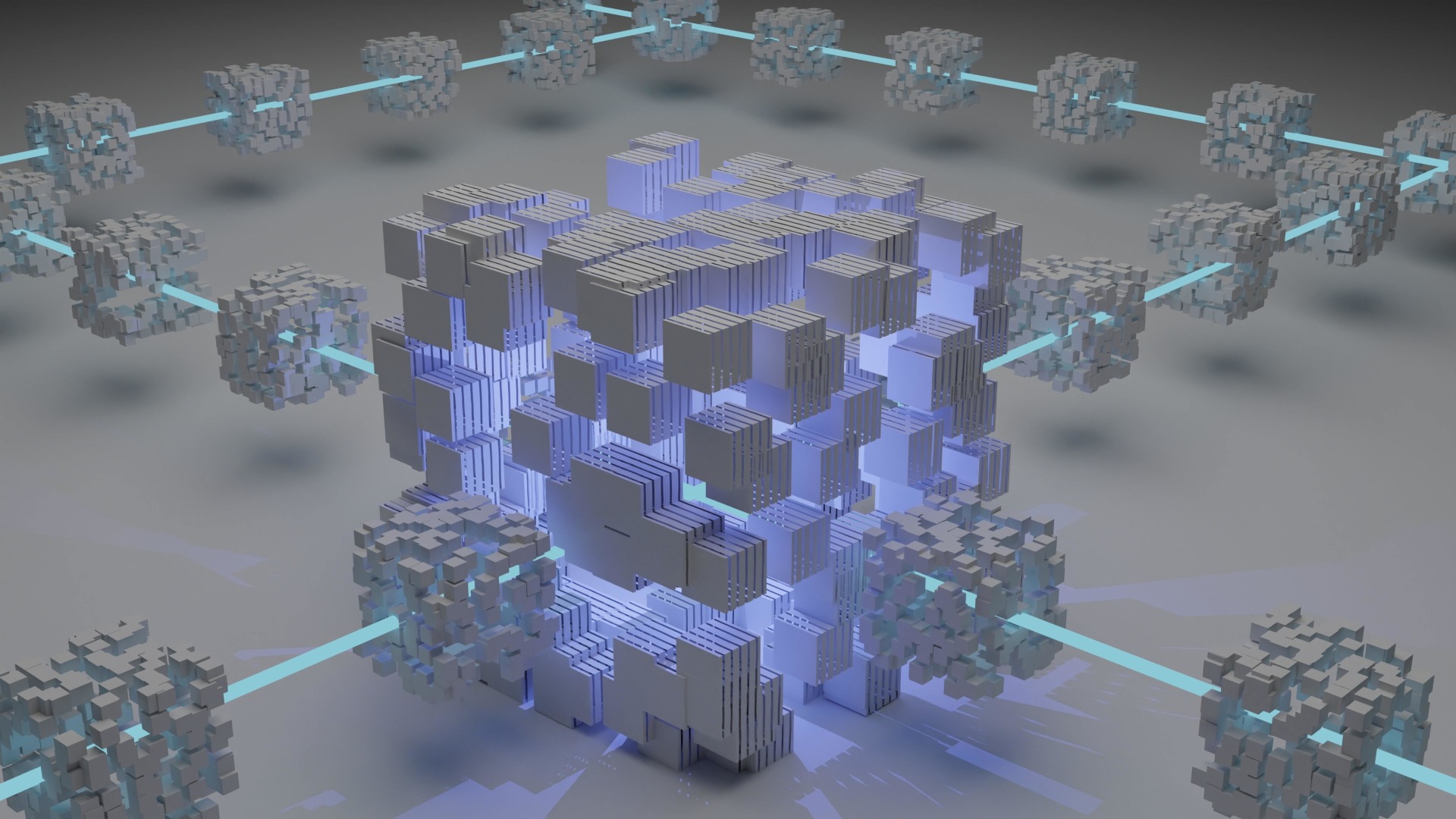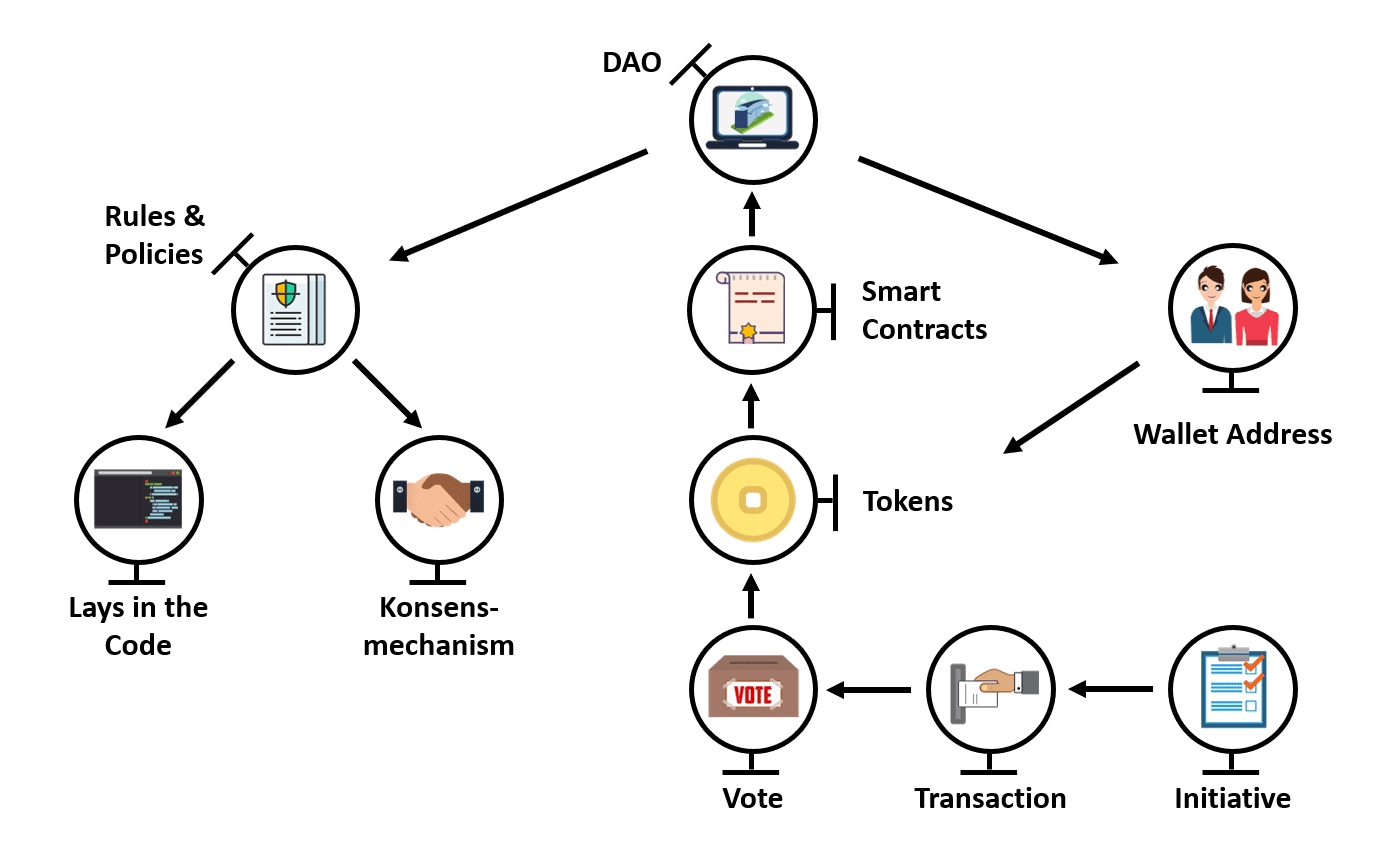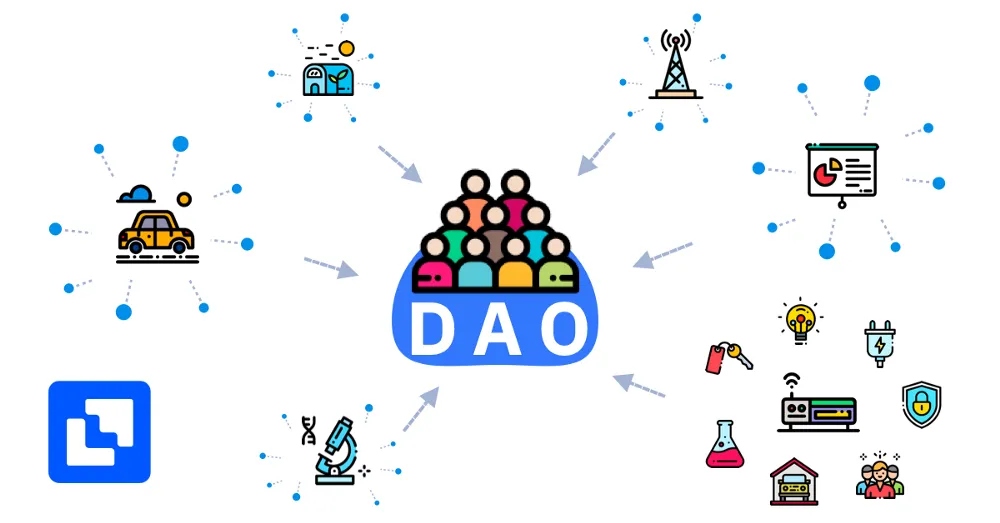Comments
- No comments found

The evolution of Decentralized Autonomous Organizations (DAOs) has triggered new pathways in this phygital era.
It has had far-reaching implications that extend beyond the blockchain technology sphere and the global digital economy.
This article examines the impact of DAOs on society and the economy while analyzing the current global landscape, converging technological trends, future directions, and the latest research in this rapidly advancing tech-fusion domain.

Decentralized Autonomous Organizations are blockchain-based entities that operate without centralized control, relying on smart contracts and token holders to make decisions. In the global landscape, DAOs have gained traction in various sectors, most notably in decentralized finance (DeFi), where they have disrupted traditional financial systems. The Decentralized Finance Market is projected to reach $497.9 Billion globally by 2032 at 43.4% CAGR, according to a report conducted by Allied Market Research and published via Bloomberg.
DeFi platforms based on DAOs provide financial services without intermediaries, offering transparency, efficiency, and accessibility. These systems have the potential to enhance financial inclusion and challenge the dominance of established financial institutions. Furthermore, DAOs have impacted governance and decision-making processes. They facilitate direct participation and voting for token holders, enabling more inclusive and democratic approaches. In political contexts, DAOs have been considered for applications such as digital governance and voting systems, potentially revolutionizing how societies make local and even national decisions.
Collaboratively governed and code-driven, decentralized autonomous organizations (DAOs) are a tech-driven exploration of how we connect, collaborate, and create. "Although DAOs today manage billions of dollars' worth of assets, engage millions of contributors, and operate across industries as diverse as finance and philanthropy, basic questions regarding operations, governance, law, and policy are only just beginning to be addressed by policy-makers, regulators and entrepreneurs" as stated in a report by the World Economic Forum.
The impact of DAOs on society and the economy is closely intertwined with other emerging and frontier technologies like IoT, AI, digital twins, 5G, and edge computing, creating a converging landscape of innovation.
One notable convergence is with the Internet of Things (IoT), where DAOs can facilitate decentralized, automated decision-making in smart cities, supply chain management, and more. This synergy between DAOs and IoT has the potential to enhance efficiency, reduce costs, and improve the quality of services and products. Another crucial consideration is the integration of DAOs with artificial intelligence (AI). By leveraging AI algorithms, DAOs can optimize decision-making processes, improve resource allocation, and enable predictive analytics in various sectors. For instance, AI-driven DAOs can assist in drug discovery, patient care, and disease management, leading to substantial improvements in public health.

Energy: Energy Asset DAOs have the potential to facilitate decentralized ownership and management of renewable energy projects like solar farms or wind turbines. Token holders collectively govern energy distribution and share profits from selling excess power back to the grid. This model enhances the accessibility of clean energy and fosters sustainability.
Transportation: In the transportation sector, Asset DAOs could be used to co-own and manage a fleet of autonomous electric vehicles. Token holders participate in decision-making regarding routes, maintenance, and pricing, creating a community-driven, eco-friendly alternative to traditional transportation services.
Aerospace: Asset DAOs in aerospace could enable fractional ownership of spacecraft, satellites, or aviation assets. Investors can collectively fund space exploration missions or satellite deployments, sharing the benefits of data collection, telecommunications, or scientific research conducted in space.
Banking:Decentralized Finance (DeFi) has popularized the use of Asset DAOs in the banking sector. These DAOs can manage digital assets, provide loans, and offer decentralized financial services to users, circumventing traditional banking intermediaries. Token holders participate in interest rate decisions and risk management.
HealthTech and Life Sciences Asset DAOs could be applied to co-fund and oversee medical research projects, clinical trials, and the development of life-saving technologies. Token holders contribute to funding and have a say in research direction, potentially accelerating breakthroughs in healthcare and life sciences.
These real-world Asset DAO applications showcase the versatility and potential of decentralized autonomous organizations across a spectrum of industries, from clean energy and transportation to aerospace, banking, and healthcare. They offer innovative, community-driven solutions that promote transparency, efficiency, and inclusivity in asset ownership and management.
The future of DAOs holds significant promise and intriguing challenges. As we transition to the next iteration of the World Wide Web (Web 3 and beyond), DAOs can play a pivotal role in addressing transparency and trust in governance. As societies increasingly demand transparency and accountability in government, corporations, and organizations, DAOs can provide robust solutions for accountability and decision-making. However, addressing security, privacy, and the potential for manipulation is critical to ensure a positive impact on society.
Moreover, DAOs are evolving beyond their current role as financial instruments and decision-making platforms. They can be foundational for smart cities deployments, and are becoming integral components of the emerging Metaverse and industrial Omniverse™, where digital and physical realities intersect. In this context, DAOs can facilitate decentralized ownership of virtual assets, govern virtual communities, and drive new economic models.
Recent research on DAOs underscores their potential societal and economic impact. Studies have explored the legal and regulatory challenges that DAOs pose, focusing on reconciling decentralized governance with existing legal frameworks. Scholars are also investigating the effectiveness of DAO-based solutions in addressing complex societal challenges, such as climate change mitigation, land ownership, and disaster response. One key area of research revolves around improving the security and scalability of DAOs. As DAOs become more prominent and handle larger sums of value and decision-making power, enhancing their robustness is a primary concern. Innovative solutions, including layer-2 scaling solutions and advanced cryptographic techniques, are being explored.
Recent publications underscore various facets of blockchain technology, cryptocurrency, and decentralized autonomous organizations (DAOs), offering a comprehensive view of the rapidly evolving digital landscape. These works delve into legal considerations, the impact on corporate law, empirical reviews, marketplace governance, and the potential implications for digital businesses.
The team of experts at SwissAssetDAO has recently published a lite paper emphasizing the need for crossing, merging, and combining Digital Assets (DA) and Real-World Assets (RWA).
Cotler's exploration of tokenized and non-tokenized assets highlights the intricate legal landscape in cryptocurrency and blockchain. The author underscores the blurring of boundaries within traditional legal frameworks due to the emergence of tokenized assets like cryptocurrencies and security tokens.
Boss conducts a legal and empirical review of DAOs, shedding light on their legal standing and real-world applications. This examination of DAOs, which operate without centralized control, provides insights into their interactions with established legal systems.
Olaniyi, Olabanji, and Okunleye offer a comprehensive review of blockchain initiatives, emphasizing decentralized autonomous organizations. Their research explores the multifaceted landscape of DAOs, encompassing their applications, governance models, and potential societal impacts.
Gonzalez investigates the impact of DAOs on corporate law, scrutinizing their frameworks and the potential legal consequences they entail. The article dissects how DAOs challenge traditional corporate structures and the evolving legal landscape surrounding these autonomous entities.
Saurabh, Upadhyay, and Rani present a multi-industry perspective on adopting blockchain-based marketplace governance platforms. Their study underscores the varying ways different industries embrace blockchain technology to govern their marketplaces and discusses the implications of this adoption.
Far, Rad, and Asaar focus on the transformative potential of blockchain and its derivatives, particularly within decentralized finance (DeFi) and the Metaverse. Their work highlights these emerging digital ecosystems' revolutionary impact and challenges.
These articles collectively represent a diverse and dynamic exploration of blockchain technology's impact on legal considerations, corporate structures, empirical insights, marketplace governance, and the future of digital businesses. They contribute to our understanding of the ever-evolving digital landscape.
Ingrid Vasiliu-Feltes, MD MBA Is a healthcare executive, futurist and globalist who is highly dedicated to digital and ethics advocacy. She is a Forbes Business Council member, digital strategist, passionate educator and entrepreneurship ecosystem builder, known as an expert speaker, board advisor and consultant. Throughout her career she has received several awards for excellence in research, teaching or leadership. She is the recipient of numerous awards most notably: WBAF World Excellence AwardSocial Entrepreneurship 2021, Top 20 Global Leaders in Digital Twins Technologies, Top 50 Global Leaders in Health Tech,Top 50 Global Ecosystem Leaders, Top 100 Visionary In Education Award 2021, Top 100 Global Women in Leadership Award 2021, Top 100 World Women Vision Award, 2021-Innovation & Tech, Top 100 Women in Social Enterprise 2021 (nominee),Top 50 Global Thinkers (Nominee),Nations of Women Change Makers Award(finalist),Top 100 Healthcare Leader 2020 Award, Top 100 Finance Leader 2020 Award, and Top 100 Women in Crypto 2020. Additionally, she serves as an Expert Advisor to the EU Blockchain Observatory Forum, and was appointed to the Board of UN Legal and Economic Empowerment Network. Dr. Vasiliu-Feltes is CEO of Softhread Inc., the Founder and CEO of The Science, Entrepreneurship and Investments Institute, and currently serving as a Country Director for WBAF USA, Senator of WBAF, Faculty Member of the WBAF Business School-Division of Entrepreneurship, and teaching the Executive MBA Business Technology Course at the UM Business School. She is also acting as the Chief Innovation Officer for the Government Blockchain Association. Most recently she served as President of Detect Genomix, Chief Quality and Safety Officer Chief and Innovation Officer for Mednax, Chief Quality and Safety Officer and Chief of Compliance for the University of Miami UHealth System During her academic tenure she taught several courses within the Medical School, as well as the combined MD/PhD and MD/MPH programs. Throughout her career, Dr. Vasiliu-Feltes held several leadership positions and is a member of numerous prestigious professional organizations. She holds several certifications, such as Bioethics from Harvard, Artificial Intelligence and Business Strategy from MIT Sloan, Blockchain Technology and Business Innovation from MIT Sloan, Finance from Harvard Business School, Negotiation from Harvard Law School, Innovation and Entrepreneurship from Stanford Graduate School of Business, Certified Professional in Healthcare Risk Management, Fellow of the American College of Healthcare Executives, Patient Safety Officer by the International Board Federation of Safety Managers, Master Black Belt in Lean and Six Sigma Management, Professional in Healthcare Quality by the National Association of Healthcare Quality, Manager for Quality and Organizational Excellence, by the American Society for Quality, and Certified Risk Management Professional by the American Society for Healthcare Risk Management. Additionally, Dr. Vasiliu-Feltes is an Honorary Advisory Board Member of several companies, as well as an Editorial Board Member for several international publications, an author and TV/Media partner.
Leave your comments
Post comment as a guest